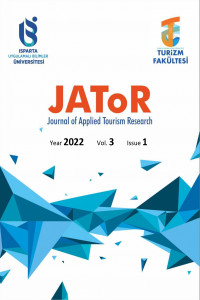Öz
Araştırma kapsamında geleceğin aşçılarının üretecekleri gıdalara karşı önyargılarının olup olmadığını ortaya çıkarmaya çalışılmıştır. Araştırma içerisinde aşçı adaylarının olası yeni tatlara karşı korku/endişe ve alışkanlıkların yarattığı geleneksel tat anlayışının hâkim olup-olmadığı tespit edilmeye çalışılmıştır. Isparta Uygulamalı Bilimler Üniversitesi aşçılık programı öğrencilerine yönelik yapılan çalışma ile aşçı adaylarının yeni tatlara ne derecede açık oldukları ve bakış açılarının etkinliği ölçülmeye çalışılmıştır. Araştırmaya katılan 268 örneklemden internet ortamında verilere ulaşılmıştır. Farklı bölgelerden eğitim amaçlı Isparta’yı tercih eden aşçılık programı öğrencilerinin yeni tatlara olan neofobisi ölçülmeye çalışılmıştır.
Kaynakça
- Cardello, A. V., Sawyer, F. M. (1992) Effects of disconfirmed consumer expectations on food acceptability. Journal of Sensory Studies,
- Cevizkaya, G., (2015). Tüketicilerin Etnik Restoran İşletmelerini Tercih Nedenleri: İstanbul’da Bir Araştırma, Balıkesir Üniversitesi, Sosyal Bilimler Enstitüsü
- Ceylan, V., Semra, A.Ş., (2019). Yetişkin Bireylerde Gıda Neofobi Düzeyinin Belirlenmesi, Journal of Tourism and Gastronomy Studies 7/2 (2019), 772-784
- Christina S., Marlow C., Forestell, A. (2022).The Effect of Parental Food Neophobia on Children's Fruit And Vegetable Consumption: A Serial Mediation Model, Appetite ,Volume 172, 1 May 2022, 105942.
- Çakıcı, C.A., Yıldız, E., (2019). Yiyecekle İlgili Kişilik Özelliklerinin Lezzet Davranışına Etkisi, Journal of Tourism and Gastronomy Studies 7/2 (2019), 898-917.
- Dağ, T., Tabak, G., (2020). Kişilik Tiplerinin Gıda Neofobisi Ve Gıda Neofilisi Üzerine Etkisi: Nevşehir’de Bir Araştırma Örneği, ROTA Journal, 2021, 2 (1), 35-54.
- Damsbo-Svendsen, M., Frøst, M.B., Olse, A. (2017).A Review of Instruments Developed to Measure Food Neophobia, Appetite 113 (2017) 358-367.
Öz
Within the scope of the research, it has been tried to reveal whether the cooks of the future have prejudices against the foods they will produce. In the research, it was tried to determine whether the traditional taste perception created by the fear/anxiety and habits of the prospective cooks against possible new tastes dominates. With the study conducted for the students of the Isparta University of Applied Sciences Cookery program, it was tried to measure how open the cooks are to new tastes and the effectiveness of their perspectives. Data were obtained from 268 samples participating in the study on the internet. It was tried to measure the neophobia to new tastes of the cookery program students who preferred Isparta from different regions for educational purposes.
Anahtar Kelimeler
Kaynakça
- Cardello, A. V., Sawyer, F. M. (1992) Effects of disconfirmed consumer expectations on food acceptability. Journal of Sensory Studies,
- Cevizkaya, G., (2015). Tüketicilerin Etnik Restoran İşletmelerini Tercih Nedenleri: İstanbul’da Bir Araştırma, Balıkesir Üniversitesi, Sosyal Bilimler Enstitüsü
- Ceylan, V., Semra, A.Ş., (2019). Yetişkin Bireylerde Gıda Neofobi Düzeyinin Belirlenmesi, Journal of Tourism and Gastronomy Studies 7/2 (2019), 772-784
- Christina S., Marlow C., Forestell, A. (2022).The Effect of Parental Food Neophobia on Children's Fruit And Vegetable Consumption: A Serial Mediation Model, Appetite ,Volume 172, 1 May 2022, 105942.
- Çakıcı, C.A., Yıldız, E., (2019). Yiyecekle İlgili Kişilik Özelliklerinin Lezzet Davranışına Etkisi, Journal of Tourism and Gastronomy Studies 7/2 (2019), 898-917.
- Dağ, T., Tabak, G., (2020). Kişilik Tiplerinin Gıda Neofobisi Ve Gıda Neofilisi Üzerine Etkisi: Nevşehir’de Bir Araştırma Örneği, ROTA Journal, 2021, 2 (1), 35-54.
- Damsbo-Svendsen, M., Frøst, M.B., Olse, A. (2017).A Review of Instruments Developed to Measure Food Neophobia, Appetite 113 (2017) 358-367.
Ayrıntılar
| Birincil Dil | Türkçe |
|---|---|
| Konular | Turizm (Diğer) |
| Bölüm | Araştırma Makaleleri |
| Yazarlar | |
| Yayımlanma Tarihi | 30 Haziran 2022 |
| Gönderilme Tarihi | 22 Haziran 2022 |
| Kabul Tarihi | 28 Haziran 2022 |
| Yayımlandığı Sayı | Yıl 2022 Cilt: 3 Sayı: 1 |


